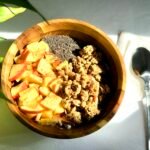Reducing inflammation is important for overall health and can help prevent chronic diseases. Here are 10 effective ways to manage and reduce inflammation in the body:
1. Adopt an Anti-Inflammatory Diet
An Anti-Inflammatory Diet puts a focus on whole, unprocessed foods that are rich in antioxidants, vitamins, and minerals. Try incorporating plenty of fruits, vegetables, whole grains, proteins, honey, healthy fats (like olive oil, butter, tallow, avocado, and fatty fish), and spices (like turmeric, ginger, garlic, and cayenne) into your diet.
2. Increase Omega-3 Fatty Acids
Good sources of Omega-3 Fatty Acids include salmon, walnuts, flaxseeds, and chia seeds.
3. Limit Processed Foods and Sugars
Reduce intake of refined sugars, grains, and processed foods. A good rule of thumb is if a food or beverage lists ingredients that you have never heard of, chances are good the ingredients are artificial, highly processed, or both.
Can’t Pronounce = Can’t Consume
4. Stay Hydrated
Drink plenty of water throughout the day. Drinking plenty of water helps maintain our cellular health and optimal kidney function. Remember that coffee and some teas aid in dehydration, so make sure you are upping your water to balance.
5. Exercise Regularly
Movement is key for your body to function properly. Try cycling, swimming, pickle ball, going to the gym (or a home workout), or simply adding extra walks during the day. Remember exercise doesn’t need to be intense to be beneficial.
6. Maintain a Healthy Weight
Having excess body fat is a stressor that can contribute to chronic inflammation. Aim for a healthy weight through a balanced diet and regular exercise. Remember that having hormonal imbalances can tip the scale even if you are exercising and eating a balanced diet. If you are struggling with your weight, do not stress over it (since that will raise your cortisol level, making it even more difficult to lose weight), just try adding more healthful habits to your day. With consistency, your are likely to see some positive results.
7. Get Enough Sleep
Prioritize good-quality sleep. Aim for 7-9 hours of uninterrupted sleep per night. Poor sleep can exacerbate inflammation and other health issues.
If you can’t sleep all at once, adding a few “cat naps” will allow you to take a break from the day and feel refreshed in a short period of time.
8. Manage Stress
Try adding some stress-reducing activities such as prayer, deep breathing, taking a bath, doing some relaxing stretches, or simply adding a few minutes of silent time to your busy day. It is important to take time to unwind as chronic stress can contribute to inflammation.
9. Consider Probiotics
Incorporating fermented foods (like yogurt, kefir, sauerkraut, kimchi, and kombucha) or taking probiotic supplements, which increase healthy gut bacteria, will support overall gut health, which may help lower inflammation levels.
10. Supplements
Some of the best supplements for inflammation include:
- Turmeric (curcumin) with black pepper (bioperine)
- Resveratrol (which is derived from red grapes and red wine)
- Garlic (which is high in allicin, a known anti-inflammatory)
- Ginger (which contains gingerol, a compound that has been shown to reduce inflammation and aid in the reduction of pain in the body).
By incorporating one or more of these strategies into your lifestyle, you may be able to effectively reduce inflammation and improve your overall health.
May God bless you and those you love!
<3 K&J
Please see our Disclaimers tab, and always speak with your healthcare provider before making any health, wellness, and/or lifestyle changes.





